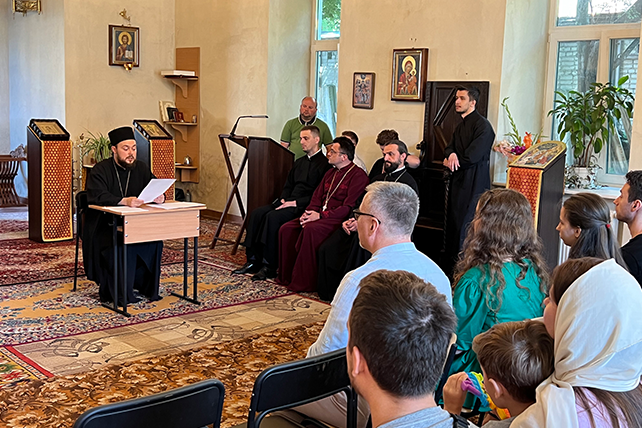LVIV, Ukraine (RNS) — On a recent Sunday, Ukrainian Orthodox Abbott Job Olshansky faced 50 stoic parishioners and presented his case for why the community should switch to the Gregorian liturgical calendar on Sept. 1.
The war in Ukraine has accelerated a restructuring of religious life across the country that aims to untangle itself from Russian influence, which has long shaped its history. The leader of the Russian Orthodox Church, Patriarch Kirill, has enthusiastically supported Russian President Vladimir Putin and the Kremlin’s view that Ukraine’s land and culture are foundationally Russian.
“The desire to preserve and affirm our own, Ukrainian, spiritual identity, protection from the aggression of the ‘Russian world,’ requires us to make a timely decision,” Olshansky told his parishioners.
For centuries, Orthodox Ukrainians saw the traditional Julian calendar as one of the anchors of their church’s identity — first as a sign of resistance to Latinization by the Catholic monarchs reigning in western Ukraine and then as resistance to the Soviet system. But in recent decades, the Julian calendar has become associated with support for Russian, not Ukrainian, Orthodoxy.
The calendar shift means millions of Ukrainians will celebrate Christmas on Dec. 25 this year instead of Jan. 7, when Russian and some other Orthodox churches celebrate. The Western Christian world adopted a revised calendar by papal decree in 1582 to correct calculations of Easter, while most of the world’s Eastern Orthodox churches began following it after a synod in 1924.
Nearly 80% of Ukrainians identify as Orthodox Christians but divide their loyalties among two rival branches. There’s the Ukrainian Orthodox Church, which has historically tied itself to the Moscow Patriarchate but claimed to untie itself in May 2022, a few months after the full-scale Russian invasion of Ukraine. And there’s the Orthodox Church of Ukraine, formally recognized as self-governing in 2019 by the Ecumenical Patriarch of Constantinople. (The first self-governing Ukrainian church formed in 1921 and was an important arm of Ukrainian nationalism, but Soviet persecution liquidated its assets, exiled clergy and forced its followers underground. Joseph Stalin revived the Russian Orthodox Church and its Ukrainian branch in 1943.)
The Moscow Patriarchate would like to hold on to the Ukrainian church because Russian Orthodoxy was birthed in Kyiv — the Ukrainian capital — and its churches account for about one-third of the Russian-based Orthodox church. To this day, it still has more registered parishes in Ukraine than the independent church.
But according to one 2022 survey, only about 4% of Ukrainians now identify with the Moscow Patriarchate, and at least 1,500 parishes have switched to the self-governing Orthodox Church of Ukraine. One impact is that more Ukrainians are hearing liturgy in Ukrainian rather than Church Slavonic, a liturgical language close to Russian.
In addition, government bans of the Russian-linked church at the local and regional levels have allowed the state, which owns many historic church buildings, to transfer leases to the newly self-governing Orthodox Church of Ukraine. A draft law under consideration by Ukraine’s Parliament could ban the older Ukrainian church. Lviv became the first city to ban it already, and dismantled what was reported to be its last remaining building in April.
“One of the reasons Russia needs to control its church so much is that those who influence the church have control of the country,” said Mikhailo Sivak, a priest at Intercession of the Theotokos Orthodox Cathedral. “If there are pro-Russians in Lviv they are few and silent. The number of Orthodox Church of Ukraine churches is increasing significantly each month.”
Holy Resurrection New Athos Monastery, where Olshansky presides, was one of dozens of churches in Lviv to transition to the independent church in March last year.
Olshansky, who was hired in 2019 to assist Metropolitan Filaret of Lviv and Galicia, said he was one of only two priests at a meeting of about 20 Ukrainian Orthodox-Moscow Patriarchate clergy a few weeks after the full-scale invasion to condemn Russia’s actions. Lviv has been a cultural center of Ukrainian nationalism for centuries.

